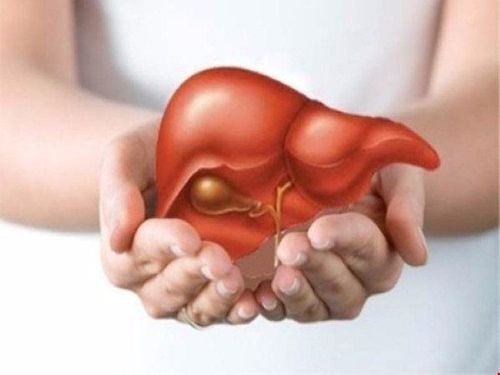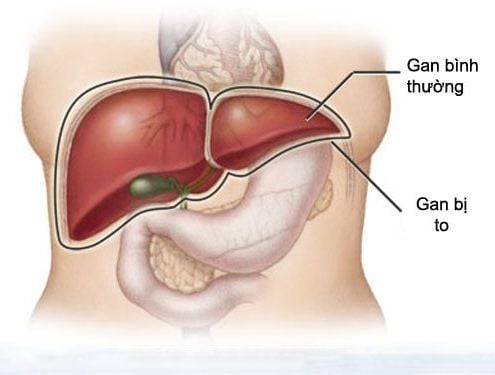This article is professionally consulted by Cao Thi Thanh Specialist Level II - Pediatrician - Pediatrics - Neonatology Department - Vinmec Hai Phong International General Hospital. Dr. Thanh has 25 years of experience in treating pediatric-neonatal diseases.
Enlarged liver is an increase in size of the liver within the abdomen, and is often not an isolated sign in a patient. Therefore, timely diagnosis of enlarged liver in children plays a decisive role in a correct diagnosis and treatment. This contributes to limiting other dangerous complications that affect the child's health.
1. What is an enlarged liver?
The liver is an organ involved in the digestive process and performs many other functions in the body, including producing bile to help digest food in the stomach into energy. It also produces essential substances such as hormones, cleanses toxins from the blood (including toxins), and controls, produces, and metabolizes fats in the body.
An enlarged liver is an increase in the size of the liver. In some cases, both the liver and spleen are enlarged, which is collectively called hepatosplenomegaly.
An enlarged liver is a sign or symptom of a disease. It can be caused by liver disease, congestive heart failure, or cancer. The main treatment is to identify the cause of the enlarged liver and control the underlying causes of this condition.

2. Causes of enlarged liver in children
There are many causes of enlarged liver in children. Depending on the cause, this condition can affect the child's health in different ways. Here are some common causes of enlarged liver in infants and young children:
- Infections causing enlarged liver in children:
- Viruses such as hepatitis A, hepatitis B, hepatitis C, hepatitis D, hepatitis E, CMV, herpes simplex virus.
- Bacterial liver infections such as sepsis, leptospirosis, syphilis
- Parasites such as malaria, Toxoplasma, Histoplasma, helminths...
- Fungi such as Actinomyces, Cryptococcosis...
- Constrictive pericarditis, hepatic vein thrombosis, Budd-Chiari syndrome, superior vena cava obstruction or meshwork of veins in the liver... are also causes of an enlarged liver in children.
- Heart failure: If heart failure occurs, it will cause circulatory problems and increase pressure on the portal vein, as the portal vein supplies blood to the liver.
- Hematological diseases causing an enlarged liver: Hemolytic anemia due to many causes (extramedullary hematopoiesis) can cause an enlarged liver in children.
- Liver cancer: If it originates from the liver, it is called primary liver cancer. If cancer spreads to the liver from other organs in the body, it is called secondary liver cancer. Both primary and secondary liver cancer can cause an enlarged liver.
- Metabolic diseases: Diseases such as Wilson's disease, glycogen storage disease, alpha-1 antitrypsin deficiency, mucolipidosis or mucopolysaccharidosis can cause an enlarged liver in infants and young children.
- Enlarged liver due to anatomical abnormalities: Anatomical abnormalities such as biliary atresia, choledochal cyst, gallstones... are causes of an enlarged liver.
- Liver injury causing hematoma or toxic hepatitis due to Acetaminophen, Fe, Vit A, toxins...
- Fatty liver in children can be due to malnutrition or vitamin deficiency.

3. How to diagnose enlarged liver in children
Enlarged liver is an increase in size of the liver within the abdomen. Enlarged liver is often not an isolated sign in a patient. Therefore, timely diagnosis of enlarged liver in children plays a decisive role in the correct diagnosis and treatment. This helps to limit other dangerous complications that affect the child's health. The methods to diagnose enlarged liver in children are as follows:
Diagnosis of enlarged liver in children based on clinical signs:
- Children have signs of abdominal pain, dull pain in the upper right quadrant of the abdomen.
- Younger children may be fussy, while older children may complain of pain.
- Children often have poor appetite, loss of appetite, leading to fatigue.
- Muscle aches; Jaundice and yellowing of the sclera
- Dark yellow urine and pale stools
- Appearance of subcutaneous bleeding and bleeding gums
Diagnosis of an enlarged liver in children based on tests:
- For Wilson's disease: Measure copper/blood and ceruloplasmin/blood to diagnose an enlarged liver in children.
- In cases of suspected infection: Perform tests such as blood culture, blood count, CRP, diagnostic serum depending on the cause.
- Bile duct obstruction: Signs of increased bilirubin, PAL, gamma GT...
- Extramedullary hematopoiesis: Use blood tests, red blood cell shape, erythrocyte enzymes, bilirubin...
- If the bleeding time is prolonged, NH3/blood is increased but albumin/blood index is decreased, it may be a sign of liver failure.
- In cases of increased ALT and AST, it may be a suggestive sign of acute liver cell damage...
Enlarged liver in children can originate from serious medical conditions, so if left untreated and not treated properly, it can lead to serious complications such as hepatic encephalopathy, liver failure, metastatic cancer, or widespread infection.

Infants and young children are generally susceptible to respiratory diseases, respiratory infections, and gastrointestinal infections if they are weaned early or if milk is not stored and prepared properly. To protect the health of children, parents should breastfeed their babies exclusively for the first 6 months (if possible) and vaccinate their children on schedule. As soon as you see your child has symptoms such as anorexia, fatigue, fussiness, and especially an enlarged liver, you should take your child to the hospital to be examined and treated by a specialist. The Pediatrics Department at Vinmec International General Hospital is a destination for the reception and examination of diseases that infants and young children are susceptible to: viral fever, bacterial fever, otitis media, pneumonia in children,... With a system of modern medical facilities and equipment, a sterile space, minimizing the impact and risk of disease transmission, Vinmec will bring satisfaction to customers and is highly appreciated by experts in the industry with:
- An equip of professional pediatricians: including highly qualified experts (professors, associate professors, doctors, masters), with rich experience, who have worked at large hospitals such as Bach Mai, 108.. The doctors are all well-trained, professional, and have a heart-mind, understanding the psychology of children. In addition to domestic pediatric specialists, the Pediatrics department also has the participation of foreign experts (Japan, Singapore, Australia, USA) who are always pioneering the application of the latest and most effective treatment protocols.
- Comprehensive services: In the field of Pediatrics, Vinmec provides a chain of continuous examination and treatment services from Newborn to Pediatrics and Vaccines, ... according to international standards to help parents take care of their children's health from birth to adulthood.
- Advanced technology: Vinmec has successfully deployed many advanced techniques to help treat difficult diseases in Pediatrics more effectively: neurosurgery, hematopoietic stem cell transplantation in the treatment of cancer.
- Professional care: In addition to understanding the psychology of children, Vinmec also pays special attention to the play space for children, helping children play comfortably and get used to the hospital environment, cooperate in treatment, and improve the effectiveness of examination and treatment.
To arrange an appointment, please call HOTLINE or make your reservation directly HERE. You may also download the MyVinmec app to schedule appointments faster and manage your reservations more conveniently.
To arrange an appointment, please call HOTLINE or make your reservation directly HERE. You may also download the MyVinmec app to schedule appointments faster and manage your reservations more conveniently.









